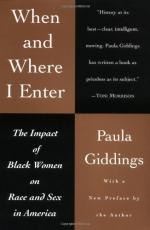
|
| Name: _________________________ | Period: ___________________ |
This test consists of 15 multiple choice questions and 5 short answer questions.
Multiple Choice Questions
1. To whom did Mary Church Terrell look to for help in her address to President Harrison?
(a) W.E.B. Du Bois.
(b) Martin Luther King, Jr.
(c) Marcus Garvey.
(d) Federick Douglass.
2. What was the name of the woman that taught former slaves in the 1860's in the South Carolina Sea Islands?
(a) Martha Banks.
(b) Mary Wright.
(c) Sara Brooks.
(d) Laura Towne.
3. According to the chapter "To be a Woman Sublime," what was judged by where a woman wanted to go rather than by where she was?
(a) Character.
(b) Morality.
(c) Worth.
(d) Equality.
4. Who was lynched at the opening of the book?
(a) Thomas Moss.
(b) Stewart Wells.
(c) Derrik Jones.
(d) Shawn Morgan.
5. What city did the lynching occur at the opening of the book?
(a) Nashville.
(b) Montgomery.
(c) Birmingham.
(d) Memphis.
6. What nation's exhibit did Frederick Douglass preside over at the exposition of 1893?
(a) Jamaica.
(b) Haiti.
(c) Cuba.
(d) South Africa.
7. What, by order of the House of Burgesses, were masters of slaves able to do to their servants?
(a) Hang them.
(b) Have intercourse with them.
(c) Starve them.
(d) Whip them.
8. Who, according to W.E.B. Du Bois, could you not bribe?
(a) White women.
(b) Black people.
(c) White people.
(d) Black women.
9. How many Whites were shot on the Saturday night raid on the local Black grocery?
(a) 5.
(b) 7.
(c) 3.
(d) 1.
10. How many lynchings occurred in 1892?
(a) 673.
(b) 307.
(c) 255.
(d) 168.
11. What was established for the purpose of invalid girls to go and help the poor?
(a) Hull House.
(b) Farcet House.
(c) Miller's House.
(d) Well-Stone Home.
12. Who was by law ordered to be whipped for laying with a negro in 1630?
(a) Frederick Salts.
(b) Richard Martin.
(c) Hugh Davis.
(d) Deacon Marks.
13. Who was the author of the first Black novel written in America?
(a) Richard M. Morester.
(b) Frederick Douglass.
(c) William Wells Brown.
(d) W.E.B. Du Bois.
14. Who, at an 1869 convention, spoke in support of the Fifteenth Amendment?
(a) W.E.B. Du Bois.
(b) Frances Ellen Harper.
(c) Donna Mary Banks.
(d) Mattie Griffith.
15. According to an article in "The Independent," as referenced by the text in the chapter "Defending Our Name," what did White women prefer to happen to "keep their husbands straight"?
(a) That "slaves were always on the verge of hostility."
(b) That "their husbands do wrong with colored women."
(c) That "the bastard children of their husbands were killed."
(d) That "they find suitable White mistresses to ensure pure blood."
Short Answer Questions
1. Who was known as the "Uncrowned Queen of American Democracy"?
2. When did the first African men and women come to Virginia?
3. Who, according to a law passed by the House of Burgesses, had to give female slaves permission before they could marry?
4. How old was Mary Church Terrell when she learned of the lynching of the grocer?
5. What happened to the Gross National Product between 1869 and 1899?
|
This section contains 467 words (approx. 2 pages at 300 words per page) |

|




